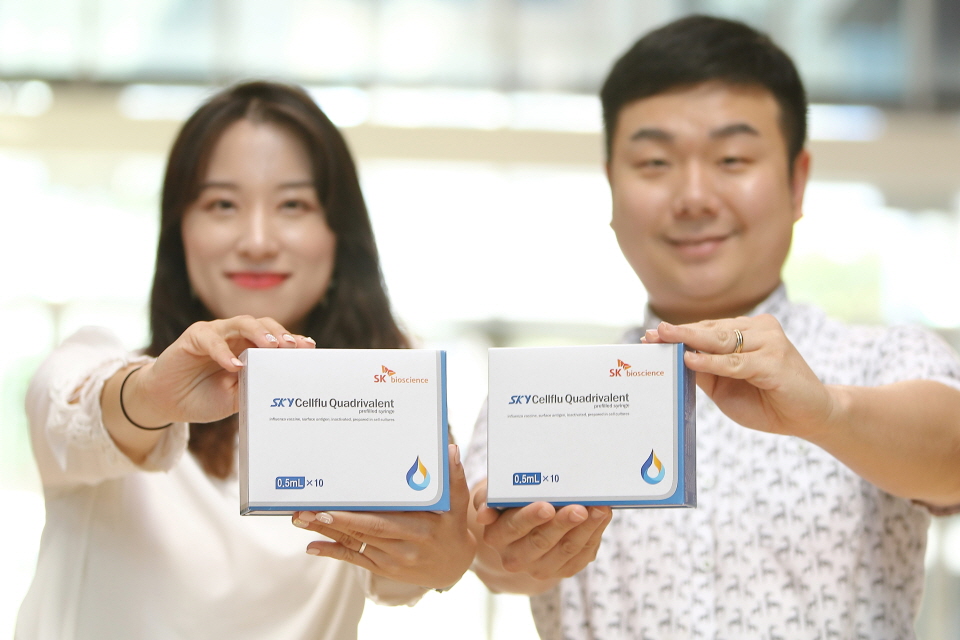● SK bioscience Exports Influenza Vaccine, 'SKYCellflu'
- Supply of approx. 250,000 inoculations of Influenza vaccine, expanding to Asia including Thailand, Malaysia
- Also actively participating in the international bidding market in the future, “We want to create a global vaccine brand”'SKYCellflu,' SK’s influenza vaccine has opened its export path.
SK bioscience (CEO Ahn Jae-yong) announced on the 17th that the company will start exporting its internally developed cell-cultured influenza vaccine, 'SKYCellflu,' since the company has obtained approvals from health authorities in Asian countries.
The initial shipment expected ahead of the flu vaccination season is about 250,000 doses (one dose is for one inoculation), and Asian countries that do not have their own influenza vaccines such as Thailand, Malaysia, Singapore, and Mongolia, are the primary targets.
Starting with this export, SK bioscience is planning to expand its overseas presence by participating in the World Health Organization (WHO) international bidding next year. SKYCellflu became the world's first cell-cultured influenza vaccine to receive WHO PQ (Pre-qualification) in April. Vaccines that have obtained PQ certification will be eligible to participate in international bids organized by UN agencies such as UNICEF and Pan-American Health Organization (PAHO).
SKYCellflu is the only cell-cultured influenza vaccine in South Korea and is produced through a state-of-the-art sterile incubator, requiring no administration of antibiotics or preservatives. Also, even people allergic to eggs will be able to receive inoculations with peace of mind. The production time is shorter and more efficient than existing egg-based vaccines, allowing a more rapid response to influenza pandemics such as swine flu.
Recently, a series of foreign studies announced that cell-cultured influenza vaccines provide a higher preventive effect as they are less likely to mutate viruses that can occur in the incubation process than vaccines produced in fertile chicken eggs.According to data that analyzed the relative effects of influenza vaccines in the 2017-2018 season by the US Food and Drug Administration (FDA) and Centers for Disease Control (CDC), the cell-cultured quadrivalent influenza vaccines showed 11% higher preventive effect than quadrivalent egg-based influenza vaccines. Also, according to the study comparing A-type H3N2 influenza virus and cell-cultured vaccine virus by the World Health Organization (WHO) in February last year, the cell-cultured vaccine virus showed a concordance rate of 91% to the egg-based virus 44% rate.
Based on these advantages, SKYCellflu has recorded sales of more than 20 million doses in its fifth year in Korea alone.
"Our cell-cultured influenza vaccine developed with domestic technology is starting to be exported in a significant volume," said Ahn Jae-yong, CEO of SK bioscience. "We are going to create a global vaccine brand that contributes to human health through innovative technology,” he said.
SK bioscience is a new vaccine company that was spun off from SK chemicals in July last year. The company has internally developed vaccines, such as ‘SKYCellflu,’ the first cell-cultured trivalent influenza vaccine in Korea, ‘SKYCellflu Quadrivalent’, the world's first cell-cultured quadrivalent influenza vaccine, ‘SKY Zoster,’ the world's second herpes zoster vaccine, and ‘SKY Varicella,’ the second varicella vaccine developed in Korea.

※ Photo description: SKYCellflu began exporting overseas